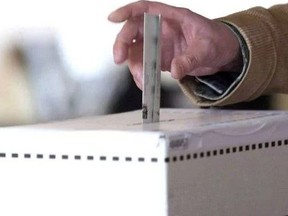The right to vote brings with it the responsibility to protect freedom and never take it for granted
Author of the article: Patricia Baker
Published Nov 18, 2024 • Last updated 1 hour ago • 8 minute read
Join the conversation

Article content
As a Canadian and dedicated voter, I have become more and more concerned about the political landscape of this country. When I reached the age of majority many years ago, this milestone gave me the constitutional right to vote, and I have taken this right seriously.
I have submitted my ballot in every federal and provincial election ever since.
The right to vote brings with it the responsibility to protect freedom and never take it for granted. But we must remember that even if we vote, we may not get what we want. We may have to live with what most voters have chosen, even if we don’t agree.
This may be why some do not bother to vote. The adage we hear, “My party isn’t going to get in anyway, so why should I bother to vote?”
When you look at countries in the world that are controlled by dictators, communists or fascists, voting is in a realm of its own. Even if this privilege exists, which is questionable, the authentic will of the people can’t evolve or exist either.
Democracies have become more and more vulnerable to outside interference, so the urgency to stand and protect us from regimes that have intentions to infiltrate our security, and integrity should have the electorate on high alert.
It has come to be a very serious and insidious under current, especially when we are going about our everyday lives, and everything seems to be as we know it.
We quite often take our freedoms and constitutional rights for granted as we get on with our lives, but it should always be a little voice in the back of our heads that we should be wary that we could be on the hit list for foreign political infiltration.
We the electorate also have a responsibility to pay attention to the directions our elected Members of Parliament (MPs) and Members of Provincial Parliament (MPPs) wish to embark upon and what their mandates and platforms for re-election are.
We may want change because we tire of the leaders and parties which have been in power for too long. But we also should be thinking about what we are changing to. In simple terms, prospective leaders may be telling us they will maintain social programs already in place or introduce new ones that are awaiting approval which will help with everyday living costs. They may also endorse funneling more funds into public health care or doing what it takes to address climate change by reducing dependence on fossil fuels.
The introduction of more liberal ideas for the curriculums in public schools while supporting dental or pharmacare for Canadians who are not financial able to access these health benefits are being put before us.
On the other side of the political spectrum, a more conservative approach to managing this country’s spending and programs may be presented as legitimate alternatives to moving this country too far to the left of centre.
Programs may be delayed, curtailed or abandoned altogether to become what is believed to be a more fiscally responsible approach to spending. The reduction of the deficit by spending more cost effectively on social programs, immigration and climate change initiatives for instance, could be presented as in a more cost-effective manner to eventually rail it in
Although the centre and left of centre political parties seem to have been more open than the right about their plans for Canadians if they are elected, voters may have to resort to reading between the lines until such time a more open dialogue is presented.
Having said that, it may be helpful to reflect on the federal parties and their past promises and performances in governments they formed after being elected. Look back at the relationships the federal and provincial governments have had with each other during their respective mandates.
Were you happy with what you got in any of the past respective governments, and did they fulfill those promises that were attainable and responsible? Did they present themselves on the world stage in a stately manner? Were they open to constructive dialogue? Did they present Canada’s value as a democracy and protect it?
Social programs such as dental, pharmacare and reproductive/abortion services are expensive to initiate and operate, but they are considered to promote healthier outcomes for those who do not have access to or cannot afford them.
The argument for acceptance is that many low even middle-income Canadians will be healthier in the long run. Ultimately these programs will save government
coffers money by reducing visits and admissions to hospitals. Poor dental hygiene and limited or no access to prescription drugs for diabetes and heart disease for example, have been correctly identified as very costly expenditures for the public health care system to sustain.
This is preventative medicine, and it has been proven over time that a healthy population is able to be much more productive and relies on health care much less than an ailing population with chronic diseases that they cannot afford to prevent in the first place.
Access and affordability are everything and yes fiscal responsibility is also required for a healthy prosperous economy to be able to grow into a stable asset. Being beleaguered under massive debt is very counterproductive.
On the other hand, if we are being promised balanced budgets, with cuts to climate change initiatives or social programs, will this in the long run balance the budget?
Will resisting calls for our reliance on fossil fuels to be harnessed and eventually over time replaced with clean energy eventually balance the budget and eliminate the deficit?
Can the effects of climate change destroy communities, flood and burn valuable land and resources while debts for restoration are handed down from one generation to the next?
Will social programs help those in need? What will happen if they are not enough?
If abortion rights are maintained at status quo, will this help women be safe and maintain their right to choose what they do with their own body?
Having said all of this, voters cannot be expected to abandon their own needs and struggles either. The economy, housing, health care, cost of living and immigration are the major issues facing Canadians.
The upcoming election could be coming sooner than later, it has not been determined, but all the parties in their unmitigated quest to govern this country are going to encourage the electorate to vote in their favour.
Promises will be made across the board, and voters will then be inundated with all sorts of information which may require serious thought and reflection. On the other hand, some voters and non-voters alike may just choose to tune it all out and change the channel.
Social media is an integral part of our lives, how we communicate, access information on a multitude of various levels and make decisions on the important aspects that affect our lives.
But social media may also provide misleading or inaccurate messaging to voters depending on which area of the political spectrum they support. The electorate has the right to base their affiliations with the parties and leaders who appeal to them on a personal level as well as those who try to address and alleviate their personal struggles.
Unfortunately, some politicians may have inclinations to bring us closer to mandates that are designed to minimize or curtail some of the rights and freedoms which citizens already possess. They may hinder the passage of laws that uphold these rights to strengthen these mandates.
Should these aspirations begin to evolve towards the erosion of the rights and freedoms of the people, this should be of great concern to the electorate. A slow but planned transition towards a government using their power to infringe and eventually eliminate the rights of their citizens can be elusive and go unaddressed until it may be too late to go back.
An example that could affect potentially half the population of Canada, would be access to abortion and reproductive services. Can these services continue to be viable and protected across Canada? Can they survive the pushback from those who believe that abortion should not be a viable choice for women?
We have seen how Roe Versus Wade, in law for over fifty years in the United States, has been challenged and overruled as each state sets its agenda. The question that still begs an answer on this side of the border is whether this could happen here.
Up until 1988, inducing an abortion in Canada was a crime and, in that year, the Supreme Court struck this ruling down calling it unconstitutional and therefore abortion was decriminalized.
It remains a publicly funded and registered medical procedure under the Canada Health Act. Women do have the Charter right to choose what happens to their bodies.
But there could also be increasing pressures on women to reconsider their decision to have an abortion based on information shared with them which they may not understand or is contrary to their wishes.
Women will seek to undergo an abortion for various reasons, many if not all have arisen from some very dark and unconscionable events. It cannot go without saying that if they are asking for the pregnancy to be terminated, it remains to be a very private matter.
There is always the possibility this choice could be influenced by some who feel she should proceed with the pregnancy, producing confusion and guilt for her even contemplating abortion.
The opioid and mental health crisis are very serious health care issues and solutions on how to treat them in a humane, yet effective program has formed a huge divide with politicians, health care providers and the electorate.
Wherever a voter’s support lies on such crisis or the political party they endorse, looking beyond personal affiliations is key to having enough science-based information available to look beyond political electoral promises.
From a left of centre approach, supervised consumption sites are promoted for homelessness and addiction. Right of centre believe Hart Hubs, which provide safety, treatment and recovery and possible mandatory admission without consent, are the way to treat this crisis.
But voters on both sides of these issues may also share support for both. There is so much to think about. But every vote counts and ultimately the electorate will decide. `
Patricia Baker is a Sault Star district correspondent, columnist and retired Sault Area Hospital nurse







